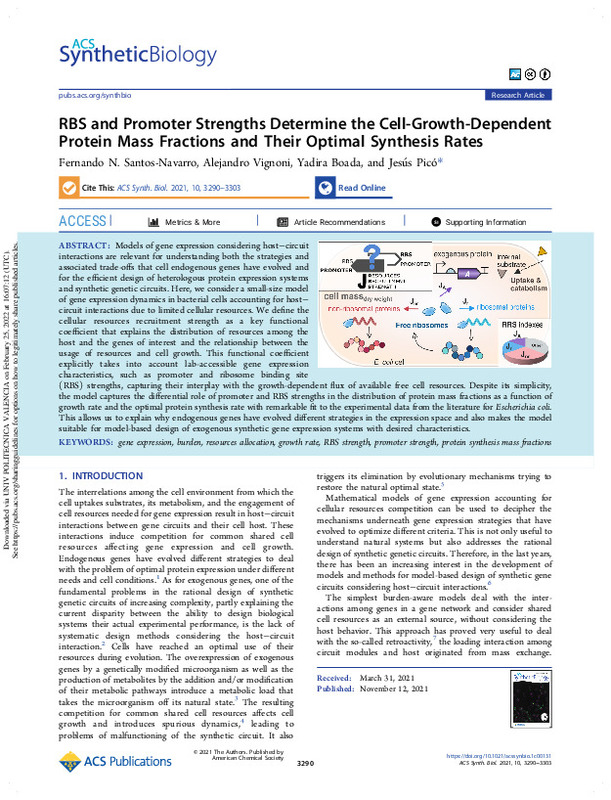JavaScript is disabled for your browser. Some features of this site may not work without it.
Buscar en RiuNet
Listar
Mi cuenta
Estadísticas
Ayuda RiuNet
Admin. UPV
RBS and Promoter Strengths Determine the Cell-Growth-Dependent Protein Mass Fractions and Their Optimal Synthesis Rates
Mostrar el registro sencillo del ítem
Ficheros en el ítem
| dc.contributor.author | Santos-Navarro, Fernando Nóbel
|
es_ES |
| dc.contributor.author | Vignoni, Alejandro
|
es_ES |
| dc.contributor.author | Boada-Acosta, Yadira Fernanda
|
es_ES |
| dc.contributor.author | Picó, Jesús
|
es_ES |
| dc.date.accessioned | 2022-06-10T18:07:06Z | |
| dc.date.available | 2022-06-10T18:07:06Z | |
| dc.date.issued | 2021-12-17 | es_ES |
| dc.identifier.uri | http://hdl.handle.net/10251/183207 | |
| dc.description.abstract | [EN] Models of gene expression considering host-circuit interactions are relevant for understanding both the strategies and associated trade-offs that cell endogenous genes have evolved and for the efficient design of heterologous protein expression systems and synthetic genetic circuits. Here, we consider a small-size model of gene expression dynamics in bacterial cells accounting for host-circuit interactions due to limited cellular resources. We define the cellular resources recruitment strength as a key functional coefficient that explains the distribution of resources among the host and the genes of interest and the relationship between the usage of resources and cell growth. This functional coefficient explicitly takes into account lab-accessible gene expression characteristics, such as promoter and ribosome binding site (RBS) strengths, capturing their interplay with the growth-dependent flux of available free cell resources. Despite its simplicity, the model captures the differential role of promoter and RBS strengths in the distribution of protein mass fractions as a function of growth rate and the optimal protein synthesis rate with remarkable fit to the experimental data from the literature for Escherichia coli. This allows us to explain why endogenous genes have evolved different strategies in the expression space and also makes the model suitable for model-based design of exogenous synthetic gene expression systems with desired characteristics. | es_ES |
| dc.description.sponsorship | This work was partially supported by grants MINECO/AEI, EU DPI2017-82896-C2-1-R, and MCIN/AEI/10.13039/501100011033 grant number PID2020-117271RB-C21. F.N.S.-N. is grateful to grant PAID-01-2017 (Universitat Politecnica de Valencia). The authors are very grateful to the anonymous reviewers for their comprehensive and in-depth reviews. | es_ES |
| dc.language | Inglés | es_ES |
| dc.publisher | American Chemical Society | es_ES |
| dc.relation.ispartof | ACS Synthetic Biology | es_ES |
| dc.rights | Reconocimiento (by) | es_ES |
| dc.subject | Gene expression | es_ES |
| dc.subject | Burden | es_ES |
| dc.subject | Resources allocation | es_ES |
| dc.subject | Growth rate | es_ES |
| dc.subject | RBS strength | es_ES |
| dc.subject | Promoter strength | es_ES |
| dc.subject | Protein synthesis mass fractions | es_ES |
| dc.subject.classification | INGENIERIA DE SISTEMAS Y AUTOMATICA | es_ES |
| dc.title | RBS and Promoter Strengths Determine the Cell-Growth-Dependent Protein Mass Fractions and Their Optimal Synthesis Rates | es_ES |
| dc.type | Artículo | es_ES |
| dc.identifier.doi | 10.1021/acssynbio.1c00131 | es_ES |
| dc.relation.projectID | info:eu-repo/grantAgreement/AEI/Plan Estatal de Investigación Científica y Técnica y de Innovación 2013-2016/DPI2017-82896-C2-1-R/ES/DISEÑO, CARACTERIZACION Y AJUSTE OPTIMO DE BIOCIRCUITOS SINTETICOS PARA BIOPRODUCCION CON CONTROL DE CARGA METABOLICA/ | es_ES |
| dc.relation.projectID | info:eu-repo/grantAgreement/UPV//PAID-01-17/ | es_ES |
| dc.relation.projectID | info:eu-repo/grantAgreement/AEI/Plan Estatal de Investigación Científica y Técnica y de Innovación 2017-2020/PID2020-117271RB-C21/ES/REGULACION DINAMICA MULTI-ESCALA EN INGENIERIA METABOLICA: CONTROL REALIMENTADO Y CICLO DBTL AUTOMATIZADO / | es_ES |
| dc.rights.accessRights | Abierto | es_ES |
| dc.contributor.affiliation | Universitat Politècnica de València. Departamento de Ingeniería de Sistemas y Automática - Departament d'Enginyeria de Sistemes i Automàtica | es_ES |
| dc.description.bibliographicCitation | Santos-Navarro, FN.; Vignoni, A.; Boada-Acosta, YF.; Picó, J. (2021). RBS and Promoter Strengths Determine the Cell-Growth-Dependent Protein Mass Fractions and Their Optimal Synthesis Rates. ACS Synthetic Biology. 10(12):3290-3303. https://doi.org/10.1021/acssynbio.1c00131 | es_ES |
| dc.description.accrualMethod | S | es_ES |
| dc.relation.publisherversion | https://doi.org/10.1021/acssynbio.1c00131 | es_ES |
| dc.description.upvformatpinicio | 3290 | es_ES |
| dc.description.upvformatpfin | 3303 | es_ES |
| dc.type.version | info:eu-repo/semantics/publishedVersion | es_ES |
| dc.description.volume | 10 | es_ES |
| dc.description.issue | 12 | es_ES |
| dc.identifier.eissn | 2161-5063 | es_ES |
| dc.identifier.pmid | 34767708 | es_ES |
| dc.identifier.pmcid | PMC8689641 | es_ES |
| dc.relation.pasarela | S\456183 | es_ES |
| dc.contributor.funder | AGENCIA ESTATAL DE INVESTIGACION | es_ES |
| dc.contributor.funder | European Regional Development Fund | es_ES |
| dc.contributor.funder | Universitat Politècnica de València | es_ES |








